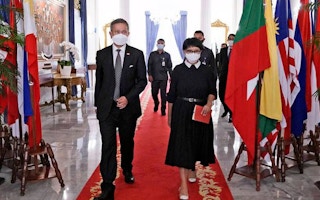Singaporean Foreign Minister Vivian Balakrishnan met with Indonesian counterpart Retno Marsudi in Jakarta – his last stop on the regional trip – where they discussed the 1 Feb military coup in Myanmar and the killing of more than 250 pro-democracy protesters there since then.
Balakrishnan said that his country and Indonesia, both members of the Association of Southeast Asian Nations, were “very distressed” by the situation in fellow member-state Myanmar and supported an ASEAN leaders’ meeting to arrive at a common position on Myanmar.
“Both Indonesia and Singapore believe there should be no foreign interference. But ASEAN stands ready to help in any way that we can help,” Balakrishnan told a news conference after his meeting with Retno, which was on the agenda of his two-day visit to Indonesia.
“Therefore, we also support our leaders getting together to generate a common position in which ASEAN can express its support for Myanmar,” said the city-state’s top diplomat, who conveyed similar messages during his stops in Brunei and Malaysia before arriving in Indonesia.
Last week, Malaysian Prime Minister Muhyiddin Yassin and Indonesian President Joko “Jokowi” Widodo called for an urgent summit of ASEAN leaders to discuss the turmoil in Myanmar. Jokowi said he would talk with Brunei, this year’s ASEAN chair, about the summit.
The 10-member regional bloc has been roundly criticised as ineffective, both by regional politicians as well as civil rights groups, for not being able to achieve a common stance on the rapidly devolving situation in Myanmar.
Non-interference in members’ domestic affairs is ASEAN’s foundational principle and a major obstacle, critics said.
It came as no surprise to many that a special meeting of ASEAN foreign ministers in early March had failed to agree on demanding the immediate release of Myanmar’s civilian leader, Aung San Suu Kyi, and others held by the military.
On Thursday, Indonesia’s Retno pointedly said that the regional group’s “goal to achieve an ASEAN Community can only be achieved with the contribution of all ASEAN Members.”
UN Urges Regional Summit
Meanwhile, a United Nations expert on Thursday also said that Myanmar’s neighbors – and indeed all other nations – needed to step up because the international response to the situation there was flagging.
An urgent meeting of Southeast Asian nations and other influential countries was imperative to prevent things in Myanmar from deteriorating more, said Thomas Andrews, U.N. Special Rapporteur on the situation of human rights in Myanmar.
“Without a focused, diplomatic solution, including the hosting of an emergency summit that brings together Myanmar’s neighbors and those countries with great influence in the region, I fear the situation of human rights in Myanmar will further deteriorate as the junta increases the rate of murders, enforced disappearances and torture,” Andrews said in a statement issued by the Office of the United Nations High Commissioner of Human Rights (OHCHR).
Andrews called on “those in the Association of Southeast Asian Nations, the European Union, the United States and China, to hold an emergency summit of all stakeholders, including the duly elected illegally deposed parliamentarians who make up the Committee Representing Pyidaungsu Hluttaw.”
Andrews was referring to a shadow parliament formed by Burmese lawmakers elected in the November 2020 vote in Myanmar, which the junta claims was marred by fraud.
In fact, a group comprising Southeast Asian lawmakers said this week that ASEAN should consider sending a joint delegation to Naypyidaw with Christine Schraner Burgener, the U.N. Special Envoy to Myanmar, to monitor the situation and help negotiate a democratic and human rights-based solution.
“The Myanmar army is killing people every day. Statements are welcome but are useless against the military’s bullets,” Charles Santiago, a Malaysian MP who chairs the ASEAN Parliamentarians for Human Rights, said in a statement.
The Assistance Association for Political Prisoners put the death toll from the Myanmar military’s crackdown on anti-coup protesters at 275.
One Indonesian analyst believed that pressure from ASEAN member-nations like Malaysia, Indonesia, and Singapore would convince Brunei to call a summit of the group’s leaders.
“These three countries are founding members of ASEAN. Combined, they hold the largest economic power and population, nearly half of the entire region,” Teuku Rezasyah, a lecturer in international relations at Padjajaran University in Bandung, told BenarNews, an RFA-affiliated online news service.
Rezasyah said Indonesia could also initiate a meeting between the Myanmar military and veteran political and military figures in the region, including former Indonesian President Megawati Sukarnoputri, former Malaysian Prime Minister Mahathir Mohamad, and former Singapore premier Goh Chok Tong.
US extends Myanmar sanctions
On the other side of the globe, meanwhile, the United States on Thursday imposed sanctions on two entities in Myanmar, in what it called “its most significant action to date to impose costs on the military regime.”
It sanctioned two of Myanmar’s largest military holding companies linked to leaders of the coup.
“All shares in them are held and managed by current or former Burmese military officers, regiments, and units, and organisations led by former service members,” U.S. Secretary of State Anthony Blinken said in a statement.
“These actions will specifically target those who led the coup, the economic interests of the military, and the funding streams supporting the Burmese military’s brutal repression. They are not directed at the people of Burma,” he said.
Washington also condemned as “abhorrent and brutal” the killings by Myanmar government forces of children as young as 7 years old.
Such acts “further demonstrate the horrific nature of the Burmese military regime’s assault on its own people,” State Department Spokesperson Ned Price said.
Copyright © 1998-2014, RFA. Used with the permission of Radio Free Asia, 2025 M St. NW, Suite 300, Washington DC 20036.










